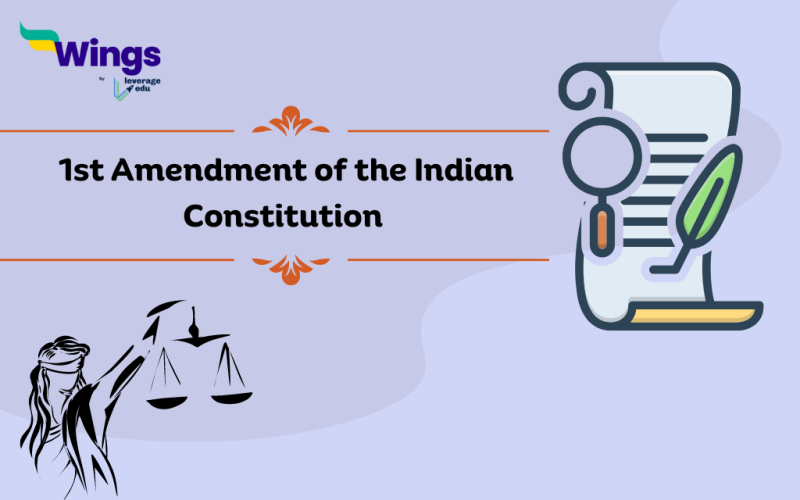The Indian Constitution is the bedrock of our democracy and was adopted in the year 1950. The Constitution was heavily drawn from various sources and also included the vision of our visionary leaders who made our Constitution. The Indian Constitution is the longest-written constitution in the world and having some amendments in it with the progressing times is mandatory. Amongst the various amendments, the 1st amendment of the Indian Constitution was enacted in 1951. In this blog, we will delve into the 1st amendments of the Indian Constitution.

What was the Background of the 1st Amendment of the Indian Constitution?
Jawaharlal Nehru the First Prime Minister of India made the motion for the amendment and finally passed it on 18th June 1951.
- The first amendment was passed by the Provisional Parliament and comprised of members who were on the drafting committee during the making of the Indian Constitution.
- The primary purpose of this amendment was to address certain inconsistencies and ambiguities that existed within the original documents.
- Articles amended were 15,19,85,87,174,176,341,342,372 and 376.
Also Read – Important Articles in Indian Constitution [Complete List]
Changes Introduced by the 1st Amendment
The 1st amendment introduced various changes related to the Fundamental Rights and introduced other restrictions.
- Restriction on Freedom of Speech and Expression: Article 19 (1)(a) guarantees the right to freedom of speech and expression. However, the 1st amendment introduced reasonable restrictions to this right and allowed the state to impose limitations in the interests of –
A. Public Order
B Friendly relations with Foreign States.
C. Incitement to an offence.
This amendment aimed to balance individual liberty with the need for social order and national security. And Thus made it justiciable.
- Validation of Zamindari Abolition Laws: Zamindari was a land-ownership system that was prevalent in India, where landlords held a large estate under the British Raj. The amendment included a provision under Article 31(A)
- Several states enacted the abolishing laws after independence, but their validity was challenged in court.
- The First Amendment clarified that these zamindari abolition laws were valid and did not violate Fundamental Rights.
Also Read – 42nd Amendment: Background, Changes
- Affirmative Action for Backward Classes: The amendment introduced Article 15 (A) and Article 16(4). It empowered the state to make “Special Provisions” for the advancement of any socially and economically backward classes of citizens. Also added Article 46. This provision aimed to address the disadvantages that were faced by certain classes or communities and to promote equality.
- Right to Trade and Profession: Article 19 (1)(g) guarantees the right to practice any profession or carry out any occupation, trade or business. The amendment clarifies that this right is subject to “reasonable restrictions” in the interests of the general public.
- Nationalisation and State Trading: The amendment clarified that state trading and nationalization of any trade or business by the state would not be deemed a violation of the right to trade or business.
Also Read – Constitutional Development of India (1946 – 1950)
Significance of the 1st Amendment
The 1st amendment of the Indian Constitution was one of the most important amendments of the Indian Constitution that showcased the quasi-rigid nature of the Constitution and helped in realising the need and importance of making amendments in the Constitution whenever needed. The amendment came as an alternative to rectify mistakes and to shape the Indian Legal system accordingly.
Also Read – Know All About Article 370 and Article 35A
However, it has also generated ongoing debates regarding the scope of individual liberties and the state’s power to impose restrictions. Certain provisions like those related to freedom of speech and expression continue to be interpreted and debated by courts and scholars.
Relevant Blogs
We hope you liked our blog. If you want to read more articles like this you can visit our general knowledge page on Indian History!
 One app for all your study abroad needs
One app for all your study abroad needs













